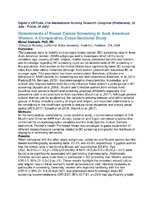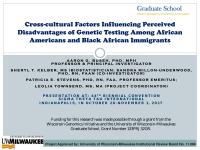| dc.contributor.author | Kulwicki, Anahid | en |
| dc.date.accessioned | 2012-09-12T09:23:18Z | |
| dc.date.available | 2012-09-12T09:23:18Z | |
| dc.date.created | Monday, July 30, 2012 | en |
| dc.date.issued | 2012-9-12 | |
| dc.identifier.uri | http://hdl.handle.net/10755/243512 | |
| dc.description.abstract | <p><strong>Purpose:</strong> The purpose of this research was to develop and standardize an evidence-based, culturally-sensitive bi-lingual (Arabic/English) measure of risk for domestic violence for use in health, mental health and social service settings for Arab American clients.</p>
<p><strong>Methods:</strong> Morgan and Kreuger's (1988) steps for focus group data collection and analysis were followed rigorously to insure the accuracy and the credibility of the study findings. An inquiry guide was developed by the Principal Investigator and was critiqued by a consultant with expertise in the field. A select group of professionals and community leaders with expertise in domestic violence were identified and recruited for this study. The study was conducted within a community-based setting for a period of six months. Health professionals and community leaders from an array of backgrounds participated in a total of 5 focus groups. The focus group discussions were designed to closely examine the risk factors for domestic violence that service providers, community leaders, and health and legal professionals feel operate in the case of Arab immigrant women who are in partner abuse relationships.</p>
<p><strong>Results:</strong> Although it is difficult to generalize about the findings because of the qualitative nature of the study, the analysis of data resulted in eight themes with regard to assessment of risk factors. Religious beliefs, family support, economic, social, immigration status, legal rights and English language skills were factors in increasing the risk for domestic violence for Arab American clients should be incorporated into the risk assessment tool.</p>
<p><strong>Conclusion:</strong> This research project identified several variables in the identification of domestic violence risk factors in a sample of Arab American immigrant women. Community leaders, service providers, and the spiritual leaders were engaged in the development of a culturally and linguistically appropriate risk assessment tool that will accurately identify risk factors for domestic violence.</p> | en |
| dc.format | Text-based Document | en |
| dc.language.iso | en | en |
| dc.subject | Arab American Women | en |
| dc.subject | Domestic Violence | en |
| dc.subject | Cultural Manifestations | en |
| dc.title | Domestic violence risk factors among Arab immigrant women | en |
| dc.type | Presentation | en |
| dc.rights.holder | <p>
All rights reserved by the author(s) and/or publisher(s) listed in this item record unless relinquished in whole or part by a rights notation or a Creative Commons License present in this item record.
</p><p>
All permission requests should be directed accordingly and not to the Sigma Repository.
</p><p>
All submitting authors or publishers have affirmed that when using material in their work where they do not own copyright, they have obtained permission of the copyright holder prior to submission and the rights holder has been acknowledged as necessary.
</p> | en |
| dc.description.note | <p>Items submitted to a conference/event were evaluated/peer-reviewed at the time of abstract submission to the event. No other peer-review was provided prior to submission to the Henderson Repository.</p> | |
| dc.type.category | Full-text | en |
| dc.evidence.level | N/A | en |
| dc.research.approach | N/A | en |
| dc.contributor.department | Non-member | en |
| dc.author.details | Anahid Kulwicki, PhD, RN | en |
| dc.conference.name | 23rd International Nursing Research Congress | en |
| dc.conference.host | Sigma Theta Tau International | en |
| dc.conference.location | Brisbane, Australia | en |
| dc.date.conferenceyear | 2012 | |
| dc.description.reviewtype | Abstract Review Only: Reviewed by Event Host | en |
| dc.description.acquisition | Proxy-submission | en |





